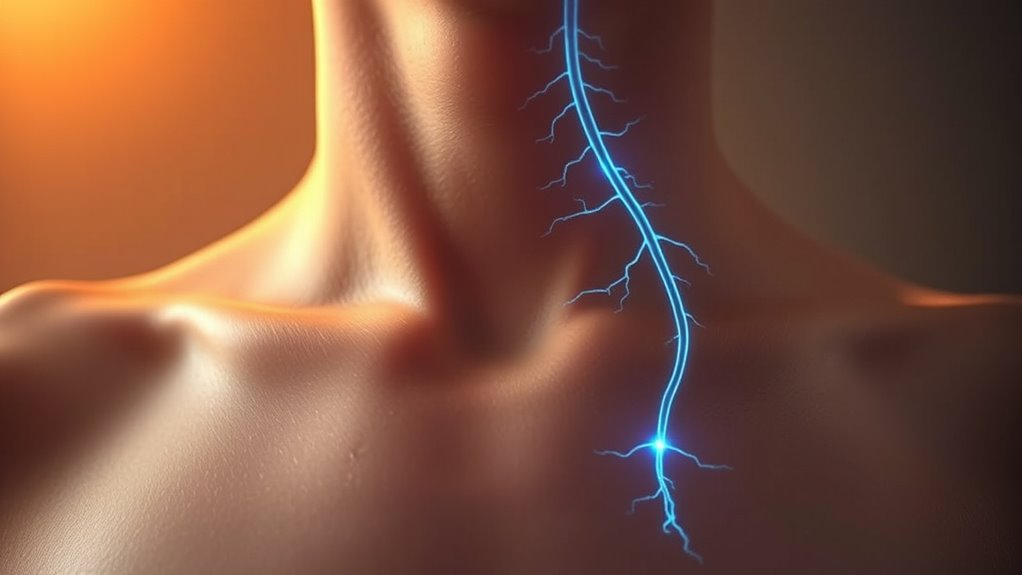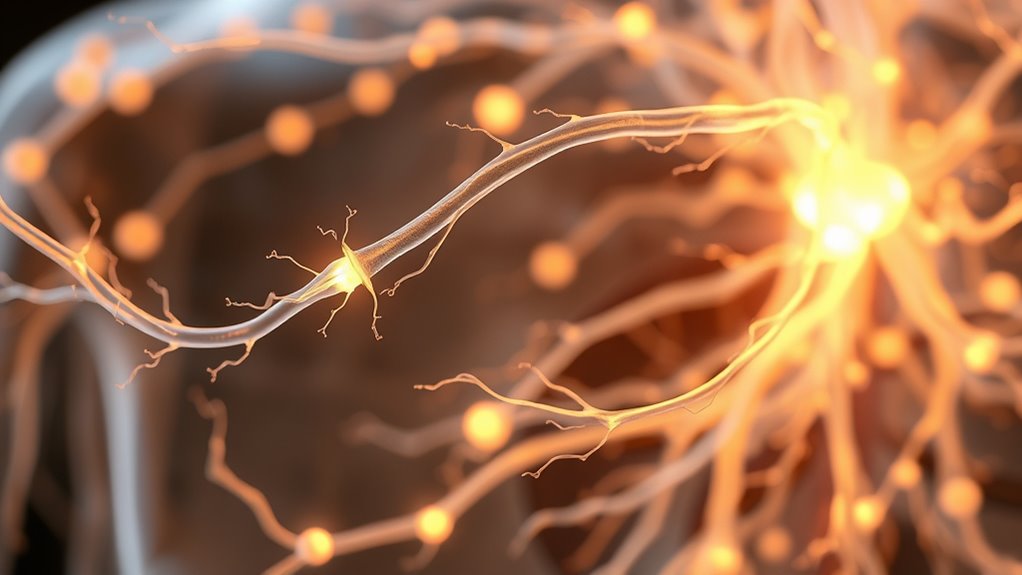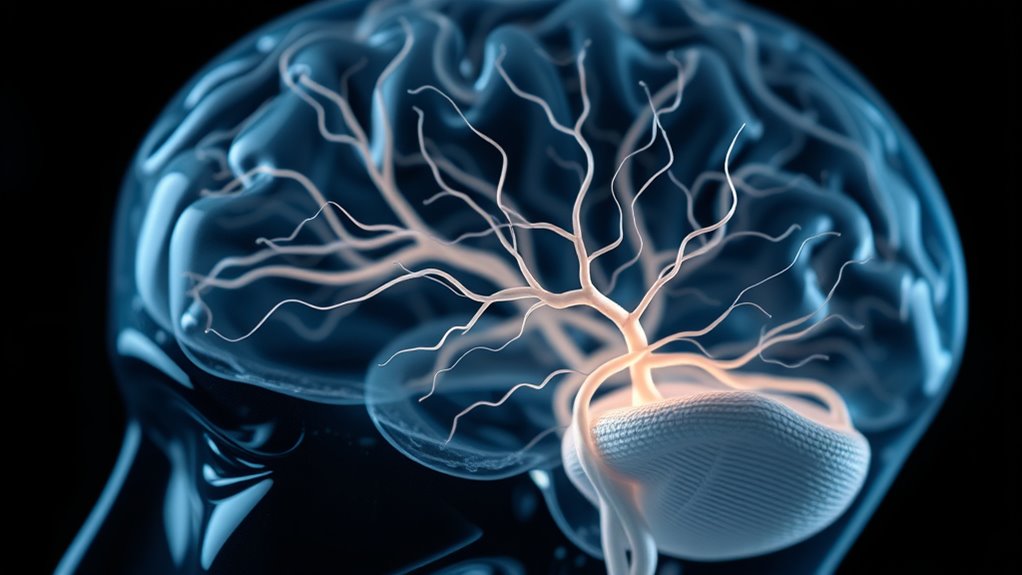The vagus nerve plays a key role in your intuitive sensing by connecting your gut and brain, allowing you to pick up on visceral signals and subconscious cues. It influences emotional awareness, decision-making, and gut feelings through pathways that regulate internal states and visceral sensations. By strengthening this nerve through practices like mindful breathing and meditation, you can enhance your inner awareness and intuition. Explore further to discover how nurturing your vagus nerve can sharpen your perception.
Key Takeaways
- The vagus nerve transmits visceral signals that contribute to gut feelings and subconscious insights, forming a basis for intuitive sensing.
- Activation of vagal pathways enhances internal cue recognition, strengthening awareness of bodily sensations linked to intuition.
- The vagus nerve facilitates gut-brain communication, influencing decision-making and instinctual responses through sensory input.
- Improved vagal tone supports emotional regulation, allowing clearer perception of subtle internal cues associated with intuition.
- Practices stimulating the vagus nerve, like mindful breathing, amplify visceral awareness and deepen intuitive sensing abilities.
Understanding the Vagus Nerve and Its Functions

Have you ever wondered how your body automatically manages so many essential functions? The vagus nerve plays a key role in this process, acting as a major part of your autonomic regulation system. It’s the longest cranial nerve, connecting your brain to crucial organs like your heart, lungs, and stomach. When your vagus nerve is functioning properly, it helps control heart rate, digestion, and even your immune response without you thinking about it. This nerve sends signals that keep your body balanced, promoting calmness and reducing stress. By understanding the vagus nerve’s role, you can see how your body maintains internal stability effortlessly. Additionally, ongoing research into autonomic regulation highlights the importance of the vagus nerve in maintaining overall health. Recognizing how nerve functions influence your well-being can empower you to take better care of your nervous system.
The Science Behind Intuitive Sensing and Gut Feelings

The vagus nerve doesn’t just regulate physical functions; it also plays a key role in what we often call gut feelings or intuitive sensing. When you experience gut feelings, your vagus nerve communicates signals between your gut and brain, influencing your instincts. This connection involves complex processes like:
- Rapid transmission of sensory information from your stomach and intestines, which helps your brain interpret internal cues swiftly and accurately
- Activation of neural pathways linked to decision-making
- Influencing subconscious perceptions and judgments
- Modulating emotional responses tied to intuition
- Enhancing your awareness of bodily states
- The essential oils used in aromatherapy can support the nervous system by promoting relaxation and reducing stress, which may indirectly influence vagus nerve activity. Supporting nervous system health can therefore improve your intuitive sensing capabilities.
All these mechanisms work together to give you that intuitive sense or “gut feeling.” The vagus nerve fundamentally acts as a communication highway, translating bodily sensations into insights that guide your decisions and perceptions without you consciously realizing it.
How the Vagus Nerve Influences Emotional Awareness

Your vagus nerve plays a key role in shaping how you recognize and respond to emotions. It influences your heart rate and links your gut feelings to your emotional state. Understanding this connection can help you better manage your emotional awareness and regulation. Additionally, practices such as fabric decorating markers can support overall stress relief, which may positively affect vagal tone. Recognizing the significance of dog names in reflecting personality traits can also contribute to a deeper understanding of emotional cues.
Vagus Nerve and Heart Rate
Because the vagus nerve plays a key role in regulating heart rate, it directly influences how you experience and interpret emotions, often without you even realizing it. A higher vagal tone signals a calm, resilient nervous system, supporting better heart health and emotional clarity. When your vagus nerve is active, it slows your heart rate, creating a sense of stability and relaxation. This connection helps you tune into subtle emotional cues and promotes emotional awareness. Factors that affect vagal tone include breathing, posture, and stress levels. Maintaining good heart health and nurturing vagal tone can enhance your intuitive sensing abilities. Additionally, as creative practice emphasizes attention and the ability to embrace failure, developing awareness of your body’s signals can foster greater resilience and innovative thinking. Remember, your heart rate variability reflects your body’s emotional state, providing valuable insights into your emotional well-being.
Emotional Regulation Pathways
The vagus nerve serves as a crucial communication highway between your brain and body, directly shaping how you recognize and regulate emotions. When you tune into your body through mindful awareness, it activates the vagus nerve’s pathways that promote calmness and emotional balance. This process helps you respond more resiliently to stress and emotional challenges, fostering greater emotional resilience. By engaging your vagus nerve through techniques like deep breathing or gentle movement, you strengthen your ability to stay centered and aware of your emotional states. This pathway enhances your overall emotional intelligence, allowing you to navigate complex feelings with clarity and composure. Additionally, understanding the benefits of vagus nerve stimulation can further improve your capacity for emotional regulation and well-being. Incorporating practices that stimulate this nerve, such as deep breathing exercises, can amplify these positive effects and support long-term emotional health.
Gut-Brain Connection
The vagus nerve acts as a crucial link between your gut and brain, transmitting signals that influence your emotional awareness. This connection means your gut health directly impacts how you perceive and process emotions. When you practice mindful eating, you enhance this communication, fostering better emotional clarity. Your gut microbiota plays a vital role by producing neurotransmitters like serotonin, which affect mood and intuition. As signals travel through the vagus nerve, they help you sense emotional states more acutely. Imagine:
- Sensing stress or calmness from gut sensations
- Recognizing anxiety through gut discomfort
- Improving mood with balanced microbiota
- Enhancing intuitive decisions via gut signals
- Strengthening emotional resilience through gut-brain dialogue
This interplay deepens your understanding of your feelings. Additionally, advancements in predictive analytics are opening new avenues for understanding how physiological signals influence emotional responses, further emphasizing the importance of the gut-brain connection. For example, emerging research highlights how neurotransmitter production within the gut can modulate emotional states and decision-making processes.
The Connection Between Vagal Tone and Decision-Making

Your vagal tone plays a key role in how calmly and clearly you make decisions, especially under pressure. When your vagus nerve is balanced, you’re better at regulating emotions and trusting your gut feelings. This connection can considerably influence your ability to make intuitive, confident choices. Additionally, cultivating practical mindfulness can help enhance vagal tone, supporting a more centered and discerning decision-making process. Incorporating stress reduction techniques such as deep breathing exercises may further improve vagal function and emotional balance.
Vagal Tone and Calm
Since vagal tone reflects the activity of your vagus nerve, it plays a crucial role in regulating your body’s stress response and overall calmness, which directly influences decision-making. When your vagal tone is high, you experience greater calmness, enabling clearer thinking and better judgment. You’re more likely to:
- Feel relaxed even in stressful situations
- Maintain steady breathing and heart rate
- Think more rationally without emotional interference
- Recover quickly from stress triggers
- Approach decisions with confidence and clarity
A strong vagal tone helps you stay grounded, reducing anxiety and promoting peace of mind. This calm state enhances your ability to process information effectively, leading to more thoughtful decisions. Improving vagal tone can therefore support your overall sense of calm and decision-making capacity. Vagal tone reflects your body’s capacity to adapt to stress, which can be strengthened through various practices.
Emotional Regulation Skills
A high vagal tone doesn’t just promote calmness; it also strengthens your ability to manage emotions effectively. When your vagus nerve is active, you’re better equipped to practice mindfulness practices that help you stay present and grounded. These techniques enhance your emotional resilience, enabling you to recover quickly from stress and avoid impulsive reactions. By regularly engaging in deep breathing, meditation, or other calming activities, you reinforce your vagal response, making emotional regulation easier. This improved regulation supports clearer decision-making, allowing you to respond thoughtfully rather than react emotionally. Additionally, a strong vagal tone can help mitigate the environmental and health impacts of stress by promoting overall well-being. Ultimately, cultivating a strong vagal tone boosts your capacity to handle life’s challenges with emotional regulation and confidence, fostering healthier relationships and greater overall well-being.
Gut Feelings Influence
The vagus nerve plays a crucial role in shaping your gut feelings, which often influence your decisions before you consciously understand why. These gut feelings are part of the mind-body connection, where subconscious signals send rapid, intuitive cues that guide your choices. When vagal tone is strong, you’re more attuned to these signals, enhancing your decision-making. Conversely, a weak vagus nerve can dull this awareness. You might notice:
- Sudden sense of unease or comfort
- Instinctive reactions to situations
- Quick emotional responses
- Flashes of insight without explanation
- Subtle bodily sensations guiding you
These cues operate beneath your conscious awareness, yet they profoundly impact your judgments and actions. By understanding this connection, you can better trust and hone your intuitive sense through vagal regulation. Developing vagal tone can also improve your overall emotional resilience and psychological well-being, fostering a stronger mind-body link. Regularly engaging in maintenance and tips such as mindful breathing or gentle physical activity can help strengthen your vagal tone over time.
Neurobiological Pathways Linking the Vagus Nerve to Inner Awareness

Neurobiological pathways connect the vagus nerve to inner awareness by transmitting signals between your body and brain. According to Polyvagal Theory, your vagus nerve plays a vital role in regulating emotional and physiological states, influencing your sense of self and environment. When your vagus nerve is stimulated, it activates specific pathways that enhance your awareness of internal cues. Vagal stimulation sends signals to brain regions responsible for processing bodily sensations, helping you recognize subtle changes in your physiology. This interconnected system allows your nervous system to interpret visceral signals, fostering a deeper sense of inner awareness. Moreover, understanding the relationship between physiological responses and conscious perception can improve emotional regulation and self-awareness. Fundamentally, these pathways form a communication highway, linking physiological responses to conscious perception, which underpins your ability to sense intuitively from within.
Practices to Stimulate the Vagus Nerve for Enhanced Intuition

Engaging in specific practices can actively stimulate your vagus nerve, strengthening its connection to your inner awareness and intuition. You can do this through simple yet effective techniques like mindful breathing and meditation. These practices promote relaxation and enhance vagal tone, boosting your intuitive sensitivity.
Try these techniques:
- Focused, slow inhaling and exhaling during mindful breathing exercises
- Body scan meditation to promote calmness and awareness
- Loving-kindness meditation to foster emotional balance
- Deep diaphragmatic breathing to stimulate vagal activity
- Guided meditations that emphasize breath awareness
Regularly practicing these methods helps deepen your mind-body connection, making your intuition sharper and more reliable over time. Consistency is key to accessingthe full potential of your vagus nerve.
The Impact of Stress and Anxiety on Vagal Function and Intuitive Perception

Stress and anxiety can considerably impair your vagal function, undermining your ability to perceive subtle intuitive signals. The stress impact triggers your sympathetic nervous system, reducing vagal tone and disrupting communication between your brain and body. Anxiety effects further weaken vagal activity, making it harder to stay grounded and receptive to internal cues. When your vagus nerve is compromised, your capacity for intuitive sensing diminishes, leading to increased confusion and emotional instability. Chronic stress and anxiety create a vicious cycle, impairing your body’s natural relaxation response and reducing the vagus nerve’s ability to support emotional regulation and heightened awareness. To maintain excellent vagal function, managing stress and anxiety is essential, as it directly influences your ability to connect with subtle intuitive insights.
Future Directions in Research on the Vagus Nerve and Human Intuition

Advances in understanding the vagus nerve’s role in human intuition are opening new research pathways that could transform how you perceive and harness internal cues. Future research aims to clarify the mechanisms linking vagal activity to intuitive decision-making, potentially leading to tailored interventions. As scientists explore this connection, you might see developments like improved biofeedback methods, non-invasive vagus nerve stimulation, and enhanced emotional regulation techniques. These innovations could deepen your awareness of subtle bodily signals, fostering better intuition in daily life. Key directions include:
- Refining vagus nerve stimulation techniques
- Investigating its influence on subconscious processing
- Integrating biofeedback with intuitive training
- Exploring its role in mental health treatments
- Developing personalized approaches to harness internal cues
This evolving research promises to liberate new ways to optimize human intuition through the vagus nerve.
Frequently Asked Questions
Can Vagus Nerve Stimulation Improve Overall Mental Clarity?
You might find that vagus nerve stimulation can boost your mental clarity by strengthening your mind-body connection. It helps regulate emotions and reduces stress, which clears mental fog and enhances focus. When your vagus nerve functions ideally, you’ll likely experience better emotional regulation, making it easier to stay calm and centered. This improved balance can lead to clearer thinking, better decision-making, and increased overall mental sharpness.
Are There Specific Foods That Naturally Enhance Vagal Function?
Think of your gut as a garden, thriving on nutrient-rich foods. To naturally enhance vagal function, focus on foods like fatty fish, berries, and fermented items that support the gut-brain axis. These foods help strengthen your vagus nerve, improving overall communication between your gut and brain. Incorporating them into your diet can boost your well-being, making your body’s signals clearer and more intuitive.
How Does Vagus Nerve Activity Differ Across Age Groups?
You might notice that vagus nerve activity varies with age, showing an age-related decline as you grow older. Developmental differences mean younger individuals often have more robust vagal responses, aiding in better regulation and sensing. As you age, your vagus nerve may become less responsive, impacting your intuitive sensing and overall well-being. Staying active and practicing relaxation techniques can help maintain vagal function across all age groups.
Is There a Genetic Component Influencing Vagal Tone and Intuition?
You might wonder if genetics shape your vagal tone and intuition. Genetic markers and hereditary influence play a role, meaning your genes can affect how your vagus nerve functions. If your family has a history of strong or weak vagal responses, it could impact your intuitive sensing. While genetics contribute, lifestyle and environment also shape your vagal tone, so you can still influence your intuitive abilities through practices like mindfulness and deep breathing.
Can Meditation or Breathing Exercises Permanently Strengthen Vagal Responses?
You can definitely strengthen your vagal responses through meditation and breathing exercises. Mindfulness benefits, like focused breathing techniques, help activate your vagus nerve, promoting relaxation and emotional resilience. Regular practice can lead to lasting improvements in vagal tone, making you more resilient to stress over time. While it may not be entirely permanent, consistent effort considerably enhances your ability to manage stress and improve overall well-being.
Conclusion
By understanding and nurturing your vagus nerve, you can enhance your intuitive sensing. For example, practicing deep breathing might improve your gut feelings during important decisions. As research advances, you’ll discover even more ways to strengthen this essential nerve, boosting emotional awareness and decision-making. Embrace simple techniques today—your inner guidance system could become clearer and more reliable, helping you navigate life’s choices with greater confidence and clarity.









